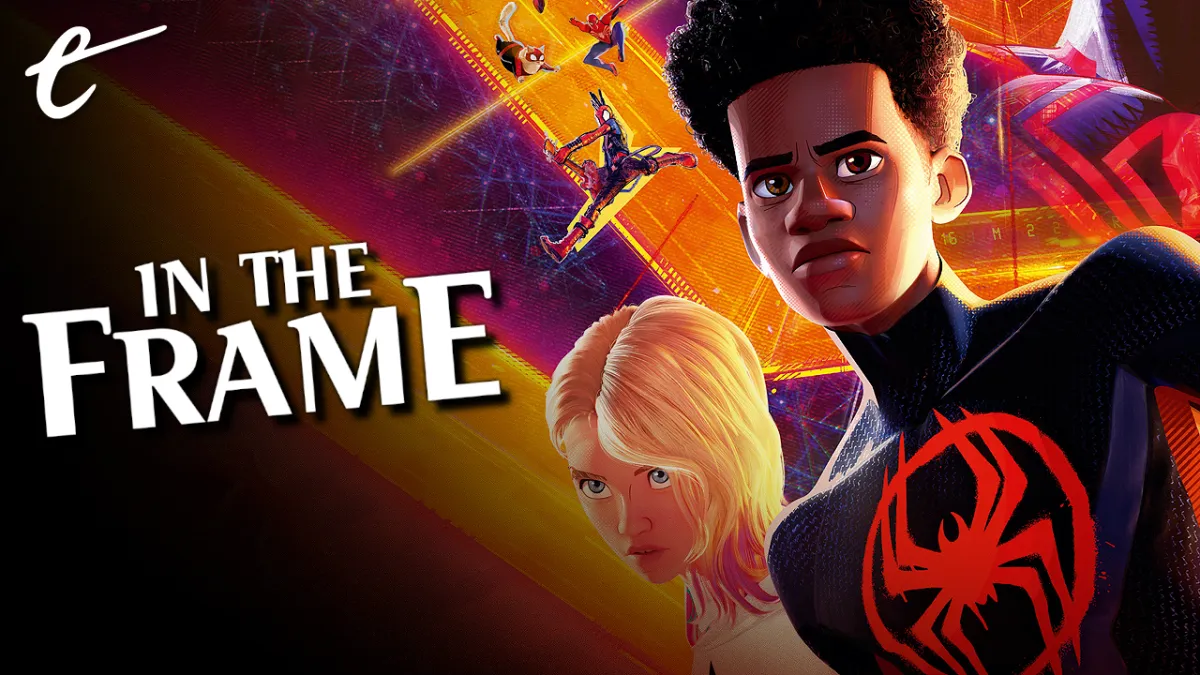This article contains spoilers for Spider-Man: Across the Spider-Verse in its discussion of parenting.
It’s interesting to note how many recent superhero movies are fundamentally about parenting.
The Marvel Cinematic Universe (MCU) defined the relationship between Tony Stark (Robert Downey Jr.) and Peter Parker (Tom Holland) as a surrogate parent and child, with Tony having his own daughter Morgan (Lexi Rabe) in Avengers: Endgame. In Thor: Love and Thunder, Thor (Chris Hemsworth) adopted Love (India Hemsworth). Guardians of the Galaxy Vol. 3 ends with the revelation that Drax (Dave Bautista) is not a Destroyer, but “a dad.”
In recent superhero projects, there’s a lot of emphasis on the importance of parenting. Black Panther: Wakanda Forever gives a lot of time to Queen Ramonda (Angela Bassett), mother to T’Challa (Chadwick Boseman) and Shuri (Letitia Wright), with Bassett the first actor to receive an Oscar nomination for their work in a Marvel Studios film. Wakanda Forever features T’Challa’s son (Divine Love Konadu-Sun) and ends with Shuri as a mentor to Riri Williams (Dominique Thorne).
There are any number of reasons why modern superhero movies are so fascinated by parenthood. Most obviously, the modern iteration of the genre has been running for over two decades now. Iron Man launched the MCU over 15 years ago. Audiences that grew up with these movies now have children of their own. A couple that went on their first date to Thor or Captain America: The First Avenger may be bringing their kids to see Guardians of the Galaxy Vol. 3.
Still, Spider-Man: Across the Spider-Verse stands apart from many of these other superhero movies about parenting because it directly engages with what it means to be a parent. The theme of parenting is woven into the fabric of the movie, in particular the anxieties of raising a child in a world that can often seem actively hostile to their very existence. It’s about the challenges of being a parent, knowing that there comes a point where a child must leave home.

Spider-Gwen (Hailee Steinfeld) and Miles Morales as Spider-Man (Shameik Moore) in Columbia Pictures and Sony Pictures Animations SPIDER-MAN: ACROSS THE SPIDER-VERSE.
Across the Spider-Verse is a story about 15-year-old Miles Morales (Shameik Moore), who has been Brooklyn’s one-and-only Spider-Man for 16 months. Miles is planning to leave New York to study physics at Princeton. He’s also seeking to join the multiversal “Spider Society,” the “elite strike force” composed of “all the best Spider-People” headed up by the mysterious Miguel O’Hara (Oscar Isaac). The audience follows Miles. They empathize with him. His decisions drive the story.
However, Across the Spider-Verse places the audience outside of Miles’ perspective. It doesn’t introduce the audience to Miles through his own voice-over narration, but instead from Gwen Stacy’s (Hailee Steinfeld) memory of him. “You think you know the rest,” she tells the audience, “but you don’t.” It’s over 20 minutes before the audience hears Miles’ voice, despite the fact that the film is introduced as his story. It’s not so much about Miles as it is about looking at Miles.
Across the Spider-Verse spends a lot of time with Miles’ parents, Rio (Luna Lauren Vélez) and Jefferson (Brian Tyree Henry). Both Rio and Jefferson worry about Miles and what is waiting for him in the larger world. “He says things that are so smart,” Jefferson confesses. “But then he does things that are so dumb.” In his Spider-Man persona, Miles suggests (under his breath) that maybe Jefferson should “get off the kid’s ass.” However, Jefferson admits that everything he does is for Miles.
Rio is constantly worried that the world is coming to take Miles away from her. “It’s hard seeing my little man not be my little boy anymore,” she concedes. She freaks out when Miles acknowledges his ambitions to go to Princeton, which is over in New Jersey and only an hour or two away. When she’s introduced to Gwen, Rio warns the teenage girl, “Don’t take him away from me.” After an awkward pause, she doubles down, “Just kidding. You can’t. He’s grounded.”

Spider-Man (Shamiek Moore) in Columbia Pictures and Sony Pictures Animations SPIDER-MAN: ACROSS THE SPIDER-VERSE.
It would be easy for Across the Spider-Verse to treat Rio and Jefferson as obstacles for Miles, as adults who simply can’t understand Miles and don’t want to. However, the film goes out of its way to stress that their possessiveness and their fear is rooted in something very real and tangible. Rio warns Miles that she worries about how the larger world “won’t look out for you like us” and that he might let somebody “tell him that he doesn’t belong.” It’s very sincere and very emotional.
It’s also what the movie is about. When Miles travels to meet the Spider Society, he explains to Hobie Brown (Daniel Kaluuya) that he comes from a home where he is loved. “That’s a shame,” Hobie replies. “That means you’re not ready for everybody else.” Sure enough, Miles’ journey into the wider multiverse culminates in O’Hara pinning him to the ground and doing exactly what Rio worried about, telling him, “You don’t belong here.” Taking his mother’s advice, Miles doesn’t back down.
There’s a specificity to these fears in Across the Spider-Verse. Miles is biracial, the child of a Puerto Rican mother and an African American father, with Rio correcting his guidance counselor’s (Rachel Dratch) assumption that he was born to “immigrant parents.” Given the reality of modern American life, there’s a resonance in Rio trying to warn her child about the danger of how the wider world will perceive him, evoking “the talk” that many minority parents have to have with their children.
However, Across the Spider-Verse expands its theme of parenthood beyond just Jefferson and Rio. The movie introduces a multiversal version of Jessica Drew (Issa Rae), who is visibly pregnant in homage to one of the character’s more recent and popular runs. O’Hara constantly watches footage of happier times with his long-lost daughter. Peter B. Parker (Jake Johnson) has worked through his anxieties from Into the Spider-Verse and is now a father to Mayday Parker.

Gwen Stacy (Hailee Steinfeld), Peter B. Parker (Jake Johnson) and his daughter Mayday in Columbia Pictures and Sony Pictures Animations SPIDER-MAN: ACROSS THE SPIDER-VERSE.
Even Gwen’s central character arc is defined by her relationship to her father, Captain George Stacy (Shea Whigham), the police captain who has been assigned the task of tracking down Spider-Woman. When he discovers her secret identity, Gwen has no choice but to flee into the multiverse and join up with O’Hara’s multiversal police squad. The subtext isn’t especially subtle. When Gwen is introduced to Jessica Drew, her first reaction is, “Can you adopt me?” In a way, Jessica does.
Gwen isn’t the only lost child who flees from a troubled home life into the Spider Society. Spider-Byte (Amandla Stenberg) doesn’t literally visit O’Hara’s Nueva York, but instead broadcasts an avatar of herself from her home dimension. The brief glimpse of her home life involves the sound of her parents shouting in another room as she wears her virtual-reality headset. She confesses to Miles, “It’s better here.”
As Peter B. Parker explains to Miles, many Spider-People are defined by the loss of a surrogate father figure. “If it wasn’t for Uncle Ben, many of us wouldn’t be here,” Peter explains, a line layered with dramatic irony. O’Hara has constructed an army of lost children, desperately running from troubled home lives or searching for replacement parental figures. The conflict between Miles and O’Hara is rooted in the argument that Miles needs to accept the inevitable death of his father, Jefferson.
Across the Spider-Verse remains humanist and optimistic in its portrayal of parenthood. Many of its parents are doing the best that they can, even when presented with absurd situations. Peter confesses to his wife, Mary Jane (Zoë Kravitz), that he has no idea whether he can be a good father to Mayday. “There’s no playbook for raising someone like her,” Mary Jane reassures him. “Or for being someone like you.” George struggles to reconcile his daughter’s secret identity.

Jessica Drew (Issa Rae) and Miguel O Hara (Oscar Isaac) in Columbia Pictures and Sony Pictures Animations SPIDER-MAN: ACROSS THE SPIDER-VERSE.
However, Across the Spider-Verse consistently argues that the key to good parenting is a willingness to listen to children. Peter dozes off reading a book titled How to Talk so Children Will Listen and How to Listen so Children Will Talk. Repeatedly throughout the film, Rio and Jefferson make a point to let Miles speak, to explain that they will be there to listen to whatever he has to say. Even in a heated argument, Jefferson’s frustration is that Miles won’t talk to them.
Despite being the first part of a two-part movie, Across the Spider-Verse works surprisingly well as a movie on its own terms because it resolves that conflict between Gwen and George Stacy. The two reconcile when George listens to his daughter. Understanding that he can’t be the cop assigned to catch Spider-Woman and the father of Gwen, George makes the only conscionable choice. He stops being a cop. Even Peter chooses to help his mentee Miles over being a part of O’Hara’s police squad. They choose parenthood.
So much of culture is rooted in these generational conflicts between parents and children, stories of kids trying to reconcile with their parents and adults trying to understand their offspring. It makes sense that these stories resonate particularly strongly at this moment in time, when the generational divide feels more pronounced than ever. The world is an increasingly turbulent place, and many parents can struggle to understand their children’s political beliefs or personal lives.
Across the Spider-Verse is so emotionally resonant because it understands a fundamental truth: the kids may not be all right right now, but they stand a much better chance of being all right in the future if their parents listen to them and stand by them. Every child has to go out into the world and face it on their own terms, and no parent knows for sure what they are doing, but a child who feels loved and heard at home will go further and stand taller even when the universe is against them.





